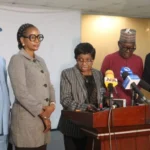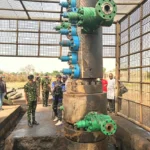Navy celebrates success against crude oil theft
Celebration By Ehigimetor Igbaugba The Nigerian Navy’s “Operation Delta Sanity” in the Niger Delta says it has significantly reduced crude oil theft, contributing to improvements in the country’s economy. Vice Admiral Emmanuel Ogalla, Chief of Naval Staff, made this statement at the graduation ceremony of the Naval Warfare Course 9Continue Reading













